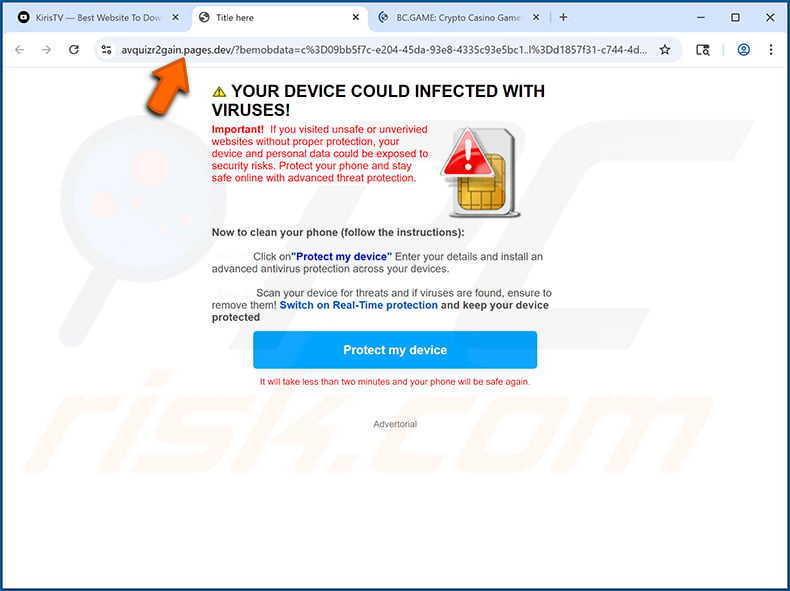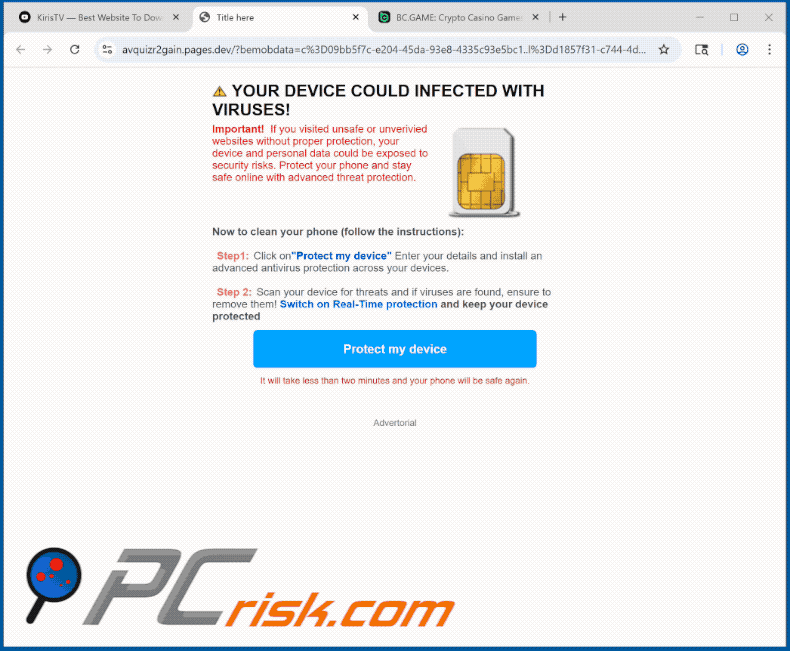How to identify scams like "Your Device Could Infected With Viruses!"
Phishing/ScamAlso Known As: Your Device Could Infected With Viruses! fake warning
Get free scan and check if your device is infected.
Remove it nowTo use full-featured product, you have to purchase a license for Combo Cleaner. Seven days free trial available. Combo Cleaner is owned and operated by RCS LT, the parent company of PCRisk.com.
What is "Your Device Could Infected With Viruses!"?
We have inspected the website and found that it runs a scam. It uses scare tactics to trick visitors into interacting with it. Falling for scams like this one can lead to unwanted downloads, monetary loss, identity theft, or other issues. Thus, if encountered, this scam website should be closed.

"Your Device Could Infected With Viruses!" scam in detail
The website displays fake messages claiming that the user's device could be infected with viruses. It warns that visiting unsafe or unverified websites without protection may put the device and personal data at risk. The site instructs visitors to follow the provided steps.
These steps involve entering personal information and installing an "advanced antivirus application" to scan for and remove threats. It falsely promises that the process is quick and will secure the device, using urgent language to pressure users into taking immediate action.
During our investigation, we found that the scam site redirected visitors to the legitimate TotalAV website, but the URL included an affiliate ID. This means the scammers were attempting to profit by tricking users into visiting TotalAV through their referral link, potentially earning a commission if the user purchased the security product.
The redirection gives the impression of legitimacy while still benefiting the malicious actors financially. It is highly advisable not to trust sites displaying fake warnings or similar messages, even if they redirect to legitimate sites and (or) promote legitimate products or services.
| Name | Your Device Could Infected With Viruses! fake warning |
| Threat Type | Phishing, Scam, Social Engineering, Fraud |
| Fake Claim | Your device could be infected with viruses |
| Disguise | Legitimate virus alert |
| Related Domain | avquizr2gain.pages[.]dev |
| Detection Names | N/A (VirusTotal) |
| Symptoms | Fake error messages, fake system warnings, pop-up errors, hoax computer scan. |
| Distribution methods | Compromised websites, rogue online pop-up ads, unwanted applications, notifications from unreliable websites. |
| Damage | Loss of sensitive private information, monetary loss, identity theft, possible malware infections. |
| Malware Removal (Windows) |
To eliminate possible malware infections, scan your computer with legitimate antivirus software. Our security researchers recommend using Combo Cleaner. Download Combo CleanerTo use full-featured product, you have to purchase a license for Combo Cleaner. 7 days free trial available. Combo Cleaner is owned and operated by RCS LT, the parent company of PCRisk.com. |
Conclusion
In conclusion, this website is a scam that uses fake warnings and urgent messages to trick users into purchasing software. Even though it redirects to a legitimate site, the affiliate link allows the scammers to profit from unsuspecting visitors. Some examples of similar scams are "Windows Defender Security Has Disabled Your Computer", "McAfee - Built-in Antivirus Has Detected A Threat", and "SYSTEM SECURITY ALERT".
How did I open a scam website?
Scam websites can be accessed through notifications from unreliable pages, links in deceptive emails, messages received from fraudsters through social media, and ads (or other content) on dubious websites or delivered by adware (or other unwanted software).
Web pages that use rogue advertising networks (e.g., pages offering illegal movie streaming services, torrent sites, adult websites) can also be used to promote scams.
How to avoid visiting scam pages?
Exercise caution with emails or messages from unknown senders, and do not click on unexpected links or open unfamiliar attachments. Only download software and files from official websites or trusted app stores, and avoid using pirated programs, cracks, or key generators.
Additionally, avoid interacting with ads, buttons, links, or pop-ups on untrustworthy websites, and do not permit shady sites to send you notifications. Regularly update the operating system and installed apps. If your computer is already infected with unwanted apps, we recommend running a scan with Combo Cleaner Antivirus for Windows to automatically eliminate them.
The appearance of "Your Device Could Infected With Viruses!" scam (GIF):

Text in the fake warning:
Your DEVICE could infected with viruses!
Important! If you visited unsafe or unverivied websites without proper protection, your device and personal data could be exposed to security risks. Protect your phone and stay safe online with advanced threat protection.Now to clean your phone (follow the instructions):
Step1:Click on"Protect my device" Enter your details and install an advanced antivirus protection across your devices.
Step 2:Scan your device for threats and if viruses are found, ensure to remove them! Switch on Real-Time protection and keep your device protected
Protect my device
It will take less than two minutes and your phone will be safe again.
Instant automatic malware removal:
Manual threat removal might be a lengthy and complicated process that requires advanced IT skills. Combo Cleaner is a professional automatic malware removal tool that is recommended to get rid of malware. Download it by clicking the button below:
DOWNLOAD Combo CleanerBy downloading any software listed on this website you agree to our Privacy Policy and Terms of Use. To use full-featured product, you have to purchase a license for Combo Cleaner. 7 days free trial available. Combo Cleaner is owned and operated by RCS LT, the parent company of PCRisk.com.
Quick menu:
- What is Your Device Could Infected With Viruses! fake warning?
- How to identify a pop-up scam?
- How do pop-up scams work?
- How to remove fake pop-ups?
- How to prevent fake pop-ups?
- What to do if you fell for a pop-up scam?
How to identify a pop-up scam?
Pop-up windows with various fake messages are a common type of lures cybercriminals use. They collect sensitive personal data, trick Internet users into calling fake tech support numbers, subscribe to useless online services, invest in shady cryptocurrency schemes, etc.
While in the majority of cases these pop-ups don't infect users' devices with malware, they can cause direct monetary loss or could result in identity theft.
Cybercriminals strive to create their rogue pop-up windows to look trustworthy, however, scams typically have the following characteristics:
- Spelling mistakes and non-professional images - Closely inspect the information displayed in a pop-up. Spelling mistakes and unprofessional images could be a sign of a scam.
- Sense of urgency - Countdown timer with a couple of minutes on it, asking you to enter your personal information or subscribe to some online service.
- Statements that you won something - If you haven't participated in a lottery, online competition, etc., and you see a pop-up window stating that you won.
- Computer or mobile device scan - A pop-up window that scans your device and informs of detected issues - is undoubtedly a scam; webpages cannot perform such actions.
- Exclusivity - Pop-up windows stating that only you are given secret access to a financial scheme that can quickly make you rich.
Example of a pop-up scam:

How do pop-up scams work?
Cybercriminals and deceptive marketers usually use various advertising networks, search engine poisoning techniques, and shady websites to generate traffic to their pop-ups. Users land on their online lures after clicking on fake download buttons, using a torrent website, or simply clicking on an Internet search engine result.
Based on users' location and device information, they are presented with a scam pop-up. Lures presented in such pop-ups range from get-rich-quick schemes to fake virus scans.
How to remove fake pop-ups?
In most cases, pop-up scams do not infect users' devices with malware. If you encountered a scam pop-up, simply closing it should be enough. In some cases scam, pop-ups may be hard to close; in such cases - close your Internet browser and restart it.
In extremely rare cases, you might need to reset your Internet browser. For this, use our instructions explaining how to reset Internet browser settings.
How to prevent fake pop-ups?
To prevent seeing pop-up scams, you should visit only reputable websites. Torrent, Crack, free online movie streaming, YouTube video download, and other websites of similar reputation commonly redirect Internet users to pop-up scams.
To minimize the risk of encountering pop-up scams, you should keep your Internet browsers up-to-date and use reputable anti-malware application. For this purpose, we recommend Combo Cleaner Antivirus for Windows.
What to do if you fell for a pop-up scam?
This depends on the type of scam that you fell for. Most commonly, pop-up scams try to trick users into sending money, giving away personal information, or giving access to one's device.
- If you sent money to scammers: You should contact your financial institution and explain that you were scammed. If informed promptly, there's a chance to get your money back.
- If you gave away your personal information: You should change your passwords and enable two-factor authentication in all online services that you use. Visit Federal Trade Commission to report identity theft and get personalized recovery steps.
- If you let scammers connect to your device: You should scan your computer with reputable anti-malware (we recommend Combo Cleaner Antivirus for Windows) - cyber criminals could have planted trojans, keyloggers, and other malware, don't use your computer until removing possible threats.
- Help other Internet users: report Internet scams to Federal Trade Commission.
Frequently Asked Questions (FAQ)
What is a pop-up scam?
A pop-up scam is a fraudulent message that appears while browsing, often warning of a fake virus or issue, and tries to trick users into taking certain steps.
What is the purpose of a pop-up scam?
These scams can be used for various purposes, like stealing personal information or money, or distributing unwanted, fake, or malicious apps.
Why do I encounter fake pop-ups?
Scam websites are often reached through browser notifications from untrustworthy sites, deceptive emails, messages on social media, and ads on risky websites or via adware. They are also frequently promoted on sites using rogue advertising networks, such as illegal streaming, torrent, or adult websites.
Will Combo Cleaner protect me from pop-up scams?
Combo Cleaner scans all websites you visit and can identify malicious ones. Websites that deliver pop-up scams are included in this detection, so the software will alert you immediately and block access to them.
Share:

Tomas Meskauskas
Expert security researcher, professional malware analyst
I am passionate about computer security and technology. I have an experience of over 10 years working in various companies related to computer technical issue solving and Internet security. I have been working as an author and editor for pcrisk.com since 2010. Follow me on Twitter and LinkedIn to stay informed about the latest online security threats.
PCrisk security portal is brought by a company RCS LT.
Joined forces of security researchers help educate computer users about the latest online security threats. More information about the company RCS LT.
Our malware removal guides are free. However, if you want to support us you can send us a donation.
DonatePCrisk security portal is brought by a company RCS LT.
Joined forces of security researchers help educate computer users about the latest online security threats. More information about the company RCS LT.
Our malware removal guides are free. However, if you want to support us you can send us a donation.
Donate
▼ Show Discussion